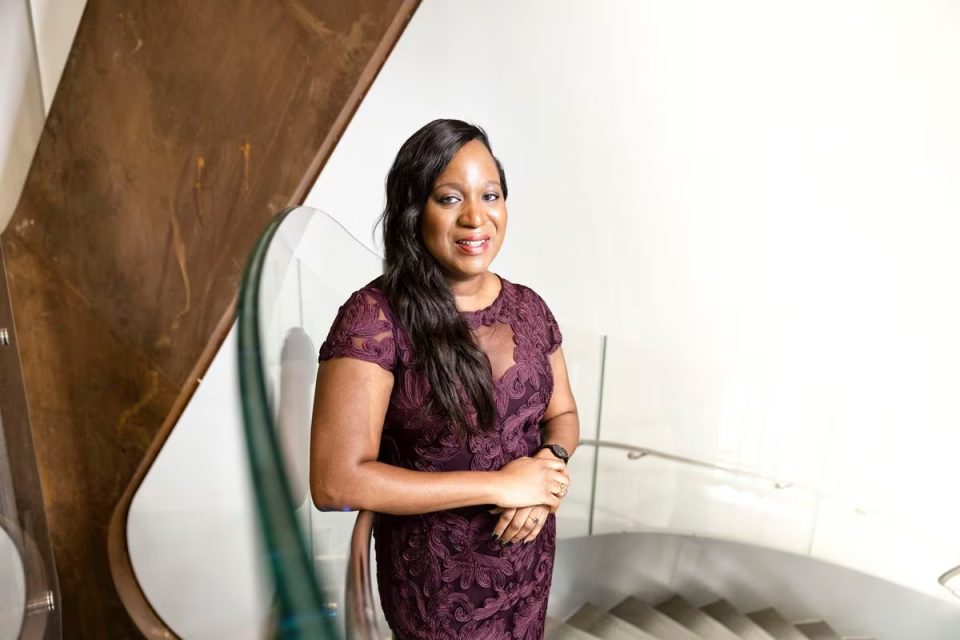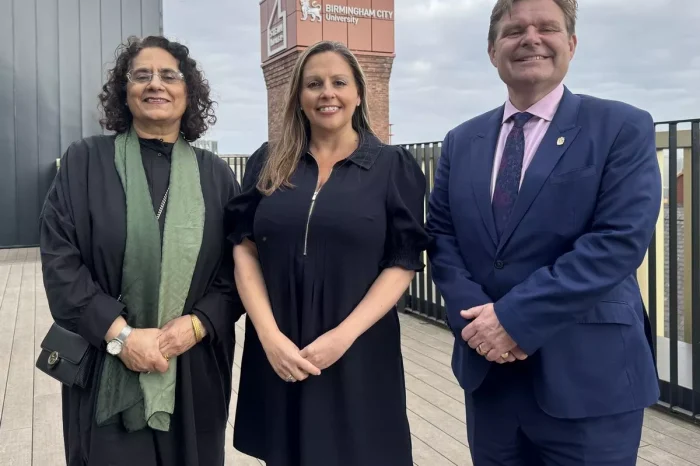Responsible AI development insights from Toju Duke’s Birmingham Business School lecture

Toju Duke, founder of Diverse AI, author of ‘Building Responsible AI Algorithms’, and former Responsible AI Lead at Google, has delved into the potential of AI as a force for good.
More than 200 staff, students, and community members of the University attended this year’s Birmingham Business School Advisory Board Guest Lecture, presented by Toju Duke.
With over 18 years of experience in sectors including advertising, retail, the not-for-profit sector, and technology, Toju is a recognised thought leader, author, and advisor on Responsible AI. Her decade-long tenure at Google encompassed leading a variety of Responsible AI programmes within the company’s product and research teams. Toju is also the founder of Diverse AI, a community interest company dedicated to supporting underrepresented groups in building a diverse and inclusive AI future. Her work includes providing global consultation and advice on Responsible AI practices.
Following the emergence of ChatGPT, AI is gaining significant attention, 66 years after its initial naming. Although AI has the potential to be beneficial, it also presents numerous limitations, risks, and challenges that could negatively impact human lives. Toju’s lecture centred on the responsible application of AI and strategies to mitigate potential harms, echoing the Business School’s commitment to responsible business practices.
Toju opened the lecture by surveying the audience on their views towards AI, expressing surprise at the number of attendees with reservations about it. She then discussed the practical applications of AI, urging the audience to view it from a more positive perspective, stating that its primary goal is “to improve people’s lives and make the world a better place”. However, Toju acknowledged that AI is not devoid of flaws.
She guided the audience through the history of AI, tracing its origins back to the 1600s. Discussing the so-called “Godfathers of AI”, Toju paused before adding, “we always hear about the fathers of AI, the Godfathers of AI, have you ever heard about the Godmothers or the mother of AI?”. She highlighted Ada Lovelace as a pivotal figure in AI’s history, commenting that the male-dominated narrative “already shows how misogynistic the technology is”.
Toju also addressed the gender biases in AI, particularly in the naming of AI assistants, which are predominantly female. “It goes back to saying women are meant to be our assistants, are meant to always help,” she explained.
Eliza, the inaugural chatbot developed in 1965, catalysed the creation of numerous AI models. Toju Duke, in her lecture, highlighted the recent intensification in AI development, a field in which she has been actively involved. She discussed the rapid pace desired by companies for these programmes and underscored her advocacy for responsible AI, stressing the importance of slowing down to ensure adequate testing and verification.
Toju observed that while Big Tech and major technology firms have recognised AI’s potential benefits for both themselves and society, this progress is unlikely to halt, noting, “our lives have changed”.
However, Toju pointed out a critical issue: the technology is not universally beneficial, a situation she insists must change given the permanence of AI in our lives. As AI becomes increasingly prevalent, she emphasised the importance of ensuring the technology is beneficial and equitable for everyone, underlining the role of responsible AI.
At this juncture, Toju shared instances of AI being utilised positively, such as in combating hunger, environmental protection, enhancing education, and aiding in crisis management. She specifically mentioned ‘Project Euphonia’, a Google Research project aimed at improving comprehension for people with non-standard speech patterns.
Turning to AI’s challenges, Toju listed social inequalities, data breaches, misinformation, violations of human rights, psychological safety issues, and privacy concerns. She provided examples, including the wrongful arrest of Robert Williams due to facial recognition inaccuracies and the gender bias in Amazon’s AI recruitment tool trained predominantly on male data.
Additional examples included allegations of sexism in Apple’s credit card algorithm, misidentification by Google Photos, biases in an exam results algorithm against disadvantaged and ethnic minority students, legal complications from AI-generated fictitious case citations, offensive remarks by a Korean chatbot, a chatbot inciting violent actions, Alexa’s dangerous advice to a child, and a tragic case of a man influenced by a chatbot to take his own life.
Highlighting the serious consequences of AI malfunctions, Toju shared a common query she encounters: “how do I convince my manager to do responsible AI?”. The examples illustrate the vast range of implications, from legal issues and brand damage to fatalities.
The lecture concluded with Toju outlining her Responsible AI Framework, encompassing principles such as AI ethics, data integrity, fairness, safety, explainability, human oversight, privacy, and robustness. These elements are crucial to ensure AI is developed responsibly and fulfils its intended purpose of enhancing human lives.
Toju concluded her talk with a reflective note, stating, “AI can be a force for good, it’s really helping to improve our lives, and it’s important we understand its pros, cons, and limitations and how to stop them, and how we can use it to be a friend and not a foe.”
Following her lecture, Toju engaged in a dynamic question and answer session, addressing topics such as safeguarding careers from AI displacement, AI’s impact on the younger generation, AI and colonialism, categorising AI as beneficial or detrimental, equipping students with AI-relevant skills, the need for regulation, and the importance of fact-checking.
Professor Edgar Meyer, the newly appointed Dean of the Business School, concluded the event by expressing his gratitude to Toju and sharing his main insight: “it’s about educating people about the challenges, as well as the opportunities.” He ended with a message of optimism, highlighting the potential for positive change in both business and AI through dedicated responsibility.






